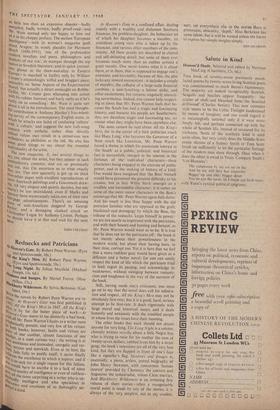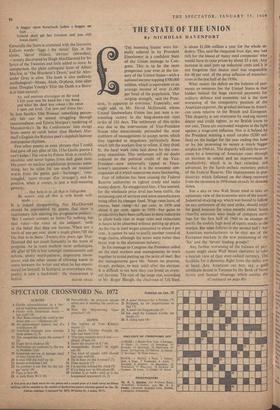Salute in Kind
Honour'd Shade. Selected and edited by Norman MacCaig. (Chambers, I 2s. 6d,)
Tuts book of seventy-seven previously uncol- lected poems by twenty-seven living Scottish poets was .commissioned to mark Burns's bicentenary. The majority are indeed recognisably Scottish. Seagulls and beaches appear frequently : 'the scatter of shell/and bleached bone/the beached driftwood' (Charles Senior). This now common style seems to be the Celtic Twilight modernised by means of imagism; and one could regard it as meaningfully national only if it were more deeply felt, and perhaps connected up with the whole of Scottish life, instead of savoured for its starkness. Scots of the 'synthetic kind is used quite often, but very rarely does the Middle-Scots poetic diction of a Sydney Smith or-Tom Scott break up sufficiently to let the particular feelings of the modern man show through. Once when it does the effect is owed to Yeats. Compare Smith's 'Vox Humana':
The campiouns by me are set on hie And by my will they hae auctoritie Beggar up and ither beggar &tin Yea tis aye the same, tis i maim aye beak static, with Yeats's cynical political epigrams:
A beggar upon horseback lashes a beggar on foot . .
`Ireland shall get her freedom and you stilt break stone.'
Generally the Scots is crammed with the favourite Lallans words—'liggs i the mauls' (lies in the clods), `derns' (hides), 'dwynes' (dwindles), —mostly discovered by Hugh MacDiarmid for his lyrics of the Twenties and little added to since. In comparison, the plain colloquial Scots of Albert Mackie, in 'The Murderer's Dram,' and Sir Alex- ander Gray is alive. The book is also endlessly mythological—Moses. Ahab, Orpheus, time after time. Douglas Young's 'Eftir the Daith o a Bairn' is at least natural:
Ay. and yestreen stravaigan on the sand I felt your wee bit hand het i my hand,
and whir the shad was rowan i the sWaw
I spak out loud, 'Tak lent and (Unita fait.
In lain Smith's 'Old Woman' something person- ally felt can be sensed struggling through
manneredness, and Edwin Morgan's rendering of Mayakovsky's 'In Re Conferences' into slangy Scots seems to catch better than Herbert Mar-
shall's English the Russian poet's slapdash humour and popular rhythms. Few other poems or even phrases that I could find gave off any glint of life. (The Gaelic poems I can't judge.) The verse by Edwin Muir is carefully idealistic and never lapses from dull good taste. His poem on nuclear annihilation promises some- thing, but he relies far too much on resonant words from the poetic past—'harbinger,' com- mingled,"more strange' (for `stranger'), and his positive, when it comes, is just a well-meaning gesture:.
. . . Our help is in all that is full-grti9m By nature, and all that is with hands well- made... .
It is indeed disappointing that MacDiarmid should be represented by poems that show a reactionary itch marring his progressive politics: 'But 1 cannot consent to listen/To nothing but that voice'—the voice of the indigent; 'sunk in the belief that they are human./When not a tenth of one per cent. show a single gleam/Of the life that is in them.' Twenty-five years ago 'Mac- Diarmid did not insult humanity in the name of progress. As in most modern verse anthologies, the glint of life is lost amongst reminiscences and echoes, pretty word-patterns, impressive reson- ances, and the other means of allowing words to come between the writer and what he has experi- enced for himself. In Scotland, as everywhere else, poetry is now a backwater : the mainstream is



































 Previous page
Previous page